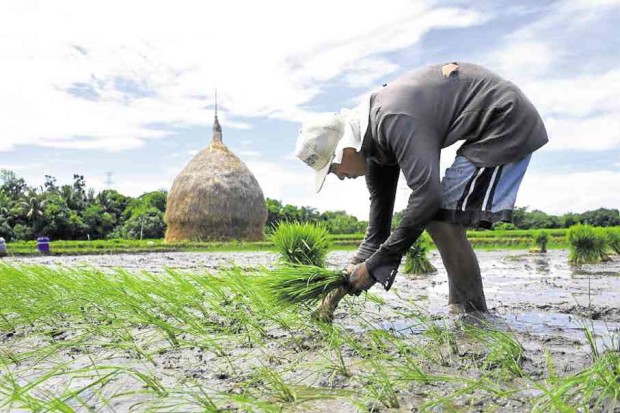Farmers’ group says Neda to blame for decline in rice importation

FILE PHOTO: Rice farmers, like this one in Barangay Niñoy in Aguilar town, Pangasinan province, spend long hours on the farm. A farmers’ organization blamed the National Economic and Development Authority (Neda) for the rice import slowdown amid an order to reduce tariffs on rice. INQUIRER/WILLIE LOMIBAO
MANILA, Philippines — A farmers’ organization blamed the National Economic and Development Authority (Neda) for the rice import slowdown amid an order to reduce tariffs on rice.
The Federation of Free Farmers Inc. (FFF) said there had been a downtrend in rice importation in June due to jitters on the validity of Executive Order (EO) No. 62, which mandates tariff cuts on rice and other select products.
“Imports were actually arriving in record volumes before EO 62 was signed last June 20. Importers are now delaying further shipments due to the uncertainty regarding the legality of EO 62,” said FFF national manager Raul Montemayor.
The FFF opposes EO 62, which cuts rice tariff from 35 percent to 15 percent, and questioned its legality before the Supreme Court.
READ: Groups ask SC to stop Marcos rice tariff order
In the 27-page petition, FFF, Samahang Industriya ng Agrikultura Inc., United Broiler Raisers Association Inc., Sorosoro Ibaba Development Cooperative, and lawyer Argel Cabatbat of Magsasaka party-list asked the high court to declare EO 62 as null, void, and unconstitutional, as the order was “hastily issued” and violated the requirement of the Customs Modernization and Tariff Act (CMTA) to conduct an investigation and public hearings on the matter.
A “flexible clause” in the Republic Act No. 10863 or CMTA requires the Tariff Commission to investigate and hold public hearings to allow interested parties a “reasonable opportunity” to be heard before Neda submits any recommendation to the President.
READ: Rice tariff cut to cost Philippines ‘less than P10B’
The petitioners also argued that lowering tariffs on rice and other agricultural products “can lead to an influx of cheaper imported goods, undermining domestic producers’ and farmers’ sales and products.”
According to the FFF, Neda endorsed the rice tariff cut to President Ferdinand Marcos Jr. without conducting required consultations with affected stakeholders.
“We cannot be faulted for questioning an EO that is legally defective, and will bring serious harm to farmers. This would not have happened if NEDA followed the law,” Montemayor said.